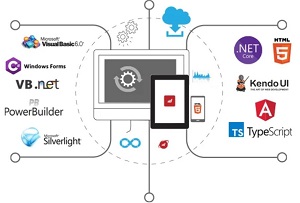News
Firm Automates Converting Visual Basic Apps to .NET Core
Mobilize.Net, an "automated modernization" specialist headed by a former Microsoft corporate VP, has upgraded its Visual Basic upgrade tool to target .NET Core, the open source, cross-platform successor of the Windows-only .NET Framework.
The Visual Basic Upgrade Companion (VBUC) now can automatically migrate legacy VB code to both platforms.
The upgrade comes some five months after Microsoft announced "We do not plan to evolve Visual Basic as a language," long after C# had become the prime focus of the company's language development efforts. The aging, proprietary .NET Framework is also being deprecated, with new feature development occurring only for .NET Core, soon to become .NET 5.
"The open source Core version is the future of Microsoft’s development platform, allowing apps to run on platforms from Windows desktops to Linux or Apple MacBooks," Mobilize.Net said in a news release this week. "Customers can also choose to modernize their VB6 code to either VB.NET (Framework only) or C# (either platform). Microsoft has previously announced it will no longer update .NET Framework and is encouraging customers to move to .NET Core."
 Mobilize.Net (source: Mobilize.Net).
Mobilize.Net (source: Mobilize.Net).
The VBUC tool is one of many offered by the Bellevue, Wash., firm, with others migrating: C#, VB.NET, VB6 and Winforms to web and cloud; Silverlight to Angular and HTML; ASP to ASP.NET and more.
Although many efforts -- both private and open source -- have been undertaken to keep VB going and please its legion of vociferous and loyal fans, none have emerged as an obvious front-runner. For example, we recently reported on a project called Mercury from RemObjects, which developed a new version of Visual Basic to run on its proprietary tool chain, just moved to beta.
Considering the dearth of viable VB offshoots gaining significant traction amid the deprecation, conversion tools might be getting more attention.
Mobilize.Net provided more information on the upgraded migration tool in an Aug. 19 blog post.
"With VBUC 8.3, you can just select the output target as .NET Core and the correct project file and dependencies will be created in your upgraded solution folder," Mobilize.Net said. "The Upgrade options that are shown will be adjusted to account for .NET Core compatibility; most are available but not all are. For example, you can migrate your ADO.DB code to ADO.NET using System.Data.Common and some helpers but not with ADO.NET using SQL Client. Obviously some older 3rd party components won't have a .NET Core library available for you to import, so you'll have to either use COM Interop or find an alternative to those dependencies. Finally, .NET Core requires C#, not VB.NET, so that option will not be available when you choose the Core option."
The tool is available in a free trial, and more information can be found in the above link to its site.
About the Author
David Ramel is an editor and writer at Converge 360.